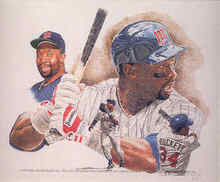
I loved Kirby Puckett the way most of us come to love anyone or anything: for what I saw, and for the way he made me feel. I loved the energy, the enthusiasm, the apparent happy-go-lucky, irrepressible bouncing Superball of a player, the way it seemed that he made everyone around him better, or at least happier.
I suppose by now I’ve learned there are a lot of things you shouldn’t trust. Politicians. The media. Hollywood. Agendas. Maybe even your eyes.
It’s been a long day with some lingering projects that have kept me from posting on Puck until now. I suspect there has been a lot said elsewhere already (yep – I didn’t have to look very far; a quick check and Doug has thoughtfully provided a list). Truth be told, part of the reason it has taken me awhile to get to this is I’ve been wondering what to write. Not if I should write, but what.
The first time I saw him in person was when he debuted at the Metrodome in ’84. He’d been called up from the minors and joined the team on a West Coast road trip and had been an immediate sensation. I was working as a scoreboard operator at the Dome then and it was my luck to draw the new kid’s first home game. As a kid I’d been at Busch stadium when Bake McBride made his debut as a late-season call-up with my Cards and always remembered the stadium announcer informing us of the fact as I watched McBride’s solid career go on. I remember thinking of that when Puck was introduced and went out to centerfield. Could he be something special, too?
It wasn’t long before a ball was lined into center and the unlikely looking kid, knees and elbows pumping, came charging in to field it on the hop. We all watched with interest as he snatched and threw … and saw the ball bounce eight times before it got to the cut-off man. Even at that, though, there was something likeable about seeing a guy so excited to be getting a chance. Of course, it soon became clear that he was the real deal. As he motored around the outfield and the basepaths as improbably as a turbo-charged bumblebee in flight he always seemed to be to be a size larger than life. I grieved the sudden glaucoma that ended his career not just because it robbed me of the chance to keep watching a once-in-a-generation player but because I knew it hurt him even more. Even then, going out, he was Puck; upbeat, smiling, saying don’t be sad for me, I’ve had the greatest opportunity a guy can have, be sad for the ones who never got a chance.
Next it was on to the Hall of Fame, and shortly after that it was the Hall of Funhouse Mirrors – twisted, distorted images at once familiar and bizarre. The stories, the allegations, the time when “touch ’em all” went from being a celebration to being an accusation, to the trial, to the acquittal and to the bitterness, and now he was larger and larger, and ultimately larger than life, or what life could sustain.
At the time of the trial, I wanted some assurances, some opportunity to say, “Say it ain’t so, Joe” to Puck. Strangely enough, the article that stuck with me, the one that touched me, was by Ralph Wiley, then writing for ESPN’s Page 2. Ironically R-Dub, too, would be another great talent taken too suddenly and too soon from us. Wiley didn’t even like Puck that much, but offered a piercing, bittersweet turn on the whole affair. I went to ESPN earlier this evening to search the archives so I could read it again and I didn’t have to dig; it had already been re-posted.
Another fair writer, William Shakespeare, had Julius Caesar say that a brave man dies only once, but a coward dies a thousand times. There’s got to be another category for superstars, though, where even the greatest leaves the field at an age where everyone else in the real world is still trying to prove themselves. For some of these there are more deaths to come: of reputation, of respect. I wasn’t quite sure of what to make of the things that happened and were said about Puck. I was sure of what I’d seen on the field but then I didn’t need a sportswriter to tell me what happened, or to create the drama. Later there was too much drama, and too many opinions, and apparently no arguing with the Umpire of Society when you get tossed.
If you sit still, however, and listen, you might be able to hear the echoes all the way from Baseball Heaven as the late Bob Casey leans into the mike and says, “Now entering, KIR-beeeeeeeeee PUCK-it!”











